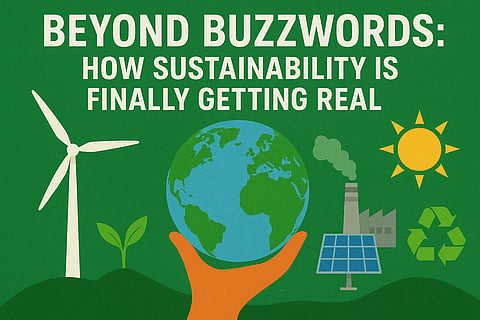Beyond Buzzwords: How Sustainability Is Finally Getting Real
The planet is heating up, glaciers are receding, and cities are choking under the weight of pollution and consumption.
For decades, “sustainability” was a feel-good catchphrase — a word that adorned corporate reports and government pledges while the real numbers told a harsher truth. But the tone has begun to shift. Across industries, boardrooms, and communities, there’s a growing realization that the window to act is closing — and that sustainability is no longer a choice but a survival strategy.
From Promises to Proof
A decade ago, sustainability initiatives were largely symbolic: a few solar panels on rooftops, glossy CSR brochures, and carbon pledges with far-off deadlines. Now, the focus is on accountability.
Tech giants are investing billions in renewable data centers. Automakers are reimagining supply chains for electric mobility. Even oil majors are quietly repositioning as “energy” companies rather than fossil fuel producers.
According to the UN Global Compact, over 90% of CEOs now say sustainability is crucial to their company’s future — but only a fraction have concrete transition plans. The gap between awareness and action remains wide, but momentum is building.
Corporate Climate Action 2.0
The new generation of sustainability is data-driven. Companies are using AI to track emissions, blockchain to ensure ethical sourcing, and circular economy models to design waste out of the system. ESG (Environmental, Social, and Governance) reporting is evolving from a compliance tool into a strategic framework. Investors are rewarding authentic sustainability — and calling out greenwashing when they see it.
Yet challenges persist. In emerging economies, access to green finance remains limited. In developed nations, political cycles often disrupt long-term commitments. But the private sector’s role is becoming indispensable — not as a substitute for government action, but as its most critical ally.
People Power: The Silent Revolution
At the heart of this shift is a cultural awakening. Gen Z consumers are choosing sustainable brands over traditional ones. Urban communities are embracing plant-based diets, local sourcing, and minimalism. What was once a niche “eco” movement is now mainstream behavior — from reusable packaging to conscious travel.
Public pressure is reshaping corporate priorities like never before. Companies that ignore sustainability risk not just reputational damage but extinction in a marketplace where conscience drives consumption.
The Road Ahead: Hope or Hype?
The good news: the world is moving. The bad news: not fast enough. Scientists warn that to limit global warming to 1.5°C, emissions must be halved by 2030 — an enormous challenge that demands collaboration on a scale humanity has rarely achieved.
But there’s reason for optimism. The conversation has matured. Sustainability is no longer a side project; it’s becoming the backbone of modern civilization — guiding innovation, investment, and individual choices alike.
Final Thought:
The sustainability story is no longer about saving the planet — the planet will endure. It’s about saving our place on it. And for the first time in human history, people, corporations, and policymakers seem to be speaking the same language: adapt, or perish.


